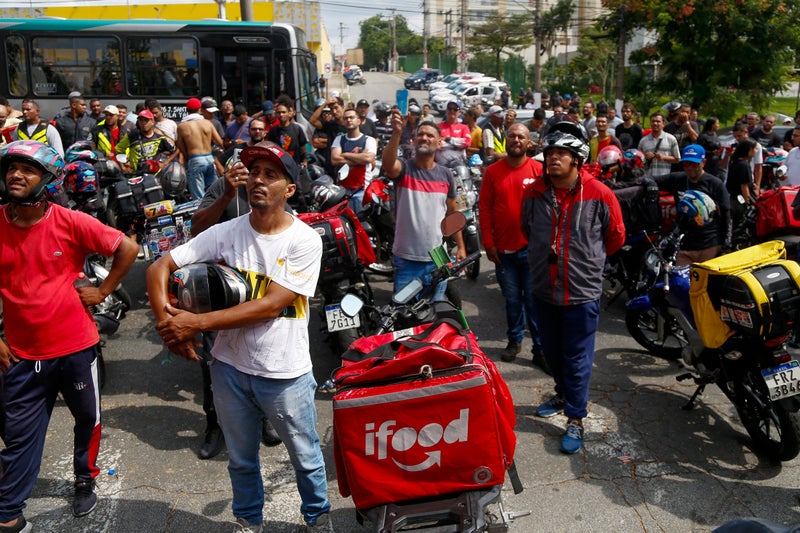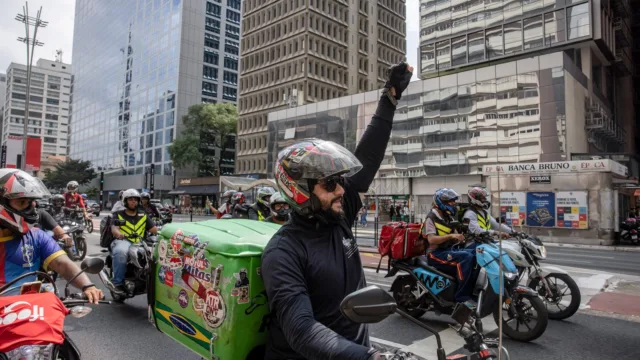Brazilian President Luiz Inácio Lula da Silva traveled to China in May, where he signed several deals including a five-year $1 billion commercial agreement with Wang Xing, the co-founder and chief executive of Meituan.
The Chinese delivery giant, fresh off a successful launch of its food delivery service, Keeta, in the Gulf, has turned its sights on Latin America — starting with Brazil. Meituan’s arrival is likely to reshape the delivery industry in the country, which has not only seen the return of China’s Didi-owned 99Food, but also the formation of an unlikely alliance between two rivals: Uber and market leader iFoodiFoodFounded in Brazil in 2011, iFood is one of the country’s leading last-mile food delivery platforms.READ MORE.
Chinese companies see that “there’s still opportunity for growth in Brazil, which iFood cannot grasp,” Leonel Paim, vice president of Abrasel, a trade organization for bars and restaurants in Brazil, told Rest of World. While iFood is likely to keep its lead in the short term, the Chinese delivery companies, through their massive investments, can transform the food delivery scene over the next decade, he said.
$23.7 billion in online food delivery services in Brazil in 2024.
Meituan “will develop and bring delivery services to a whole new level.” Competition brought on by the Chinese companies may prompt the well-established players to offer better products and lower their fees for restaurants, ultimately resulting in cheaper deliveries, said Paim.
The dominant force in China’s on-demand services sector, Meituan is aggressively pursuing foreign markets. In Hong Kong, Keeta became the second-largest food service app soon after its launch in 2023, displacing British rival Deliveroo. Earlier this year, Keeta expanded to several major Saudi cities, becoming the third-largest food delivery platform just four months after its debut.
Meituan’s success is largely due to its aggressive tactics such as higher pay for riders, deep consumer discounts, and low fees for restaurant partners. It has paid off: Meituan reported a revenue of $12 billion in the first quarter of 2025, up from $10.2 billion in the same period last year.
The Chinese food giant is now bringing its disruptive playbook to Latin America, a region where online food delivery services are expected to grow from $23.7 billion at the end of last year to $36.7 billion by 2030, according to Grand View Research, a market research and consulting company. Brazil has the biggest share of Latin America’s food delivery market. The delivery sector in the country is expected to hit $20.9 billion in revenue by the end of 2025, and 90 million users by 2030, according to data compiled by Statista.
“Every bit of new competition makes us happy because it helps us,” Pedro Facchini, a restaurant owner in São Paulo who recently met with representatives from Meituan, told Rest of World.
Meituan will have to contend with iFood. The Brazilian delivery service, launched in 2011, controls over 80% of the market, according to Databricks, a global data intelligence firm. With 400,000 restaurants and 55 million clients, the company has been nearly unchallenged since 2023, when both Uber Eats and 99Food halted operations in Brazil after struggling against iFood’s dominance, Paim said.
Now, iFood is gearing up for competition from its deep-pocketed rivals. In April, amid rumors of Meituan’s arrival in Brazil, the Chinese-owned Didi announced the return of 99Food delivery services, along with $180 million in investment. The following month, iFood and Uber announced a partnership, which allows users to book Uber rides through iFood’s app and access food, grocery, and pharmacy items through the Uber app. The alliance was not timed to the entry of the Chinese firms, a spokesperson for iFood told Rest of World.
“It is a long-term movement, drawn long before the current competitive scenario, and it reflects our vision of the future for delivery and mobility in Brazil,” the spokesperson said, without giving more details.
Uber did not reply to a request for comment from Rest of World on its partnership with iFood or its plans for Uber Eats in Brazil.
For now, iFood charges restaurants as much as 27% per order — in contrast to Meituan, which aims to attract businesses by offering lower fees. “[IFood] does as it pleases and makes no agreements,” Paim told Rest of World. In-app purchases and deliveries account for up to 35% of a restaurant’s revenue, so they are forced to agree to these terms, he said.
While the arrival of Meituan could signal healthier competition in the industry, some believe the benefits will be short-lived, especially for delivery workers.

Miguel Schincariol/AFP via Getty Images)
“In the beginning, they will be paying well, so they can gain [the trust of] delivery workers,” Edgar da Silva, president for AMABR, a union group for delivery workers in Brazil, told Rest of World. But as the market stabilizes, Meituan “will become just like the others. There will be no difference but who exploits us more,” he said.
During its first year of operations in Brazil, Meituan expects to hire 1,000 workers, up to 4,000 call center operators, and 100,000 delivery personnel, a company spokesperson told Rest of World.
Meituan and 99Food expect to wrest market share from iFood in Brazil by offering more services on their apps, including ride-hailing. They are likely to focus on recruiting the small businesses that iFood has historically neglected because of their inability to pay its high commissions, according to Paim.
The two Chinese giants are expected to charge restaurants lower fees. While Keeta has not disclosed details, the company has a history of undercutting its rivals by charging lower rates — part of its strategy in Hong Kong and the Gulf. Meanwhile, 99Food is providing newly registered restaurants zero-fee operations for the next two years, and offering a minimum of $45.85 per day for delivery workers who complete at least 15 orders or rides. IFood currently pays between $1.19 to $1.37 per delivery.
Consumers may gain the most from this rivalry. Pedro Lima, a student pilot in São Paulo, places orders on iFood twice a week between exams and practice flights. He hopes food delivery prices will go down with the return of 99Food and the arrival of Keeta.
“It is quite likely for me to end up ordering more [often],” Lima told Rest of World. He’ll choose restaurants that offer cheaper meals, he said. “It’s good to have more options.”









